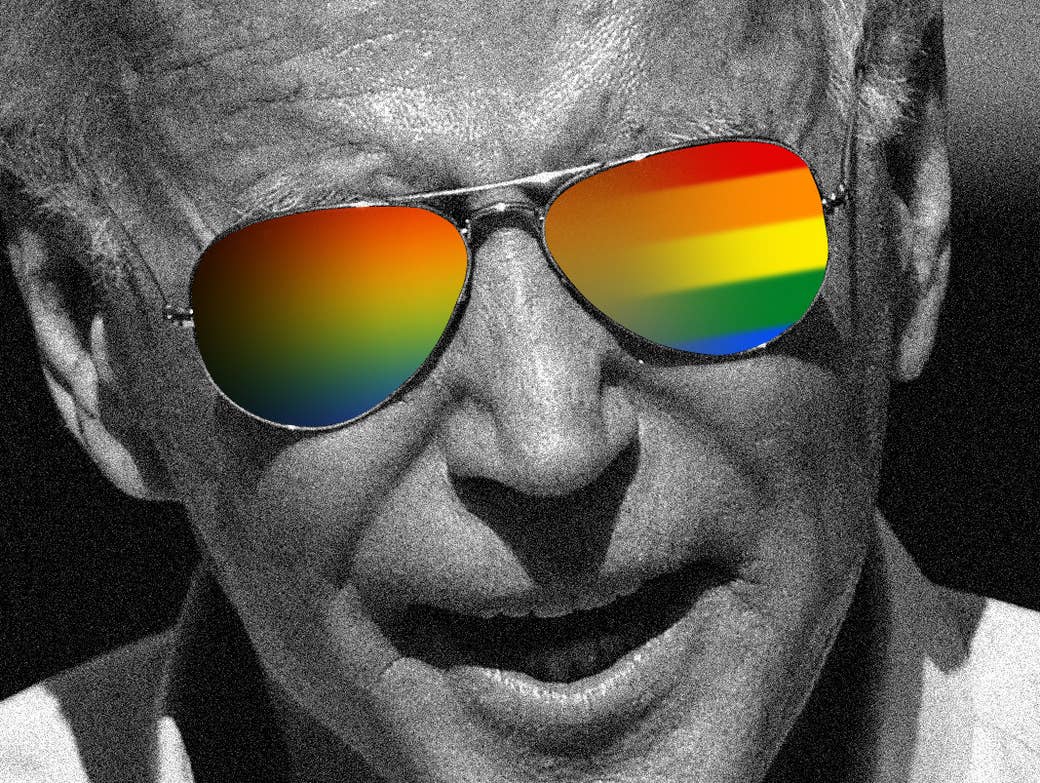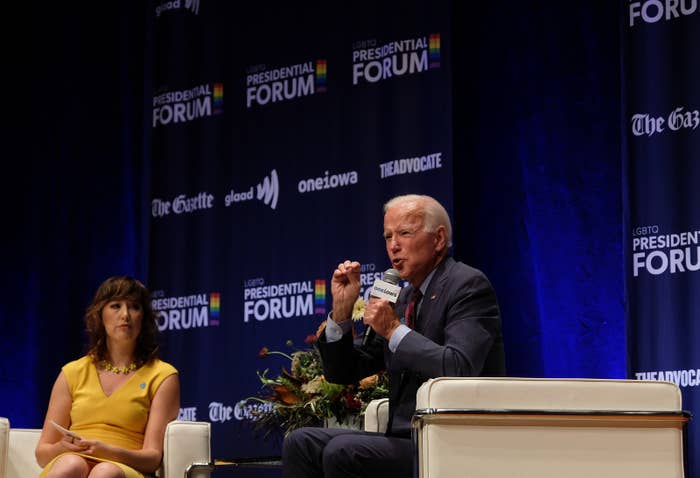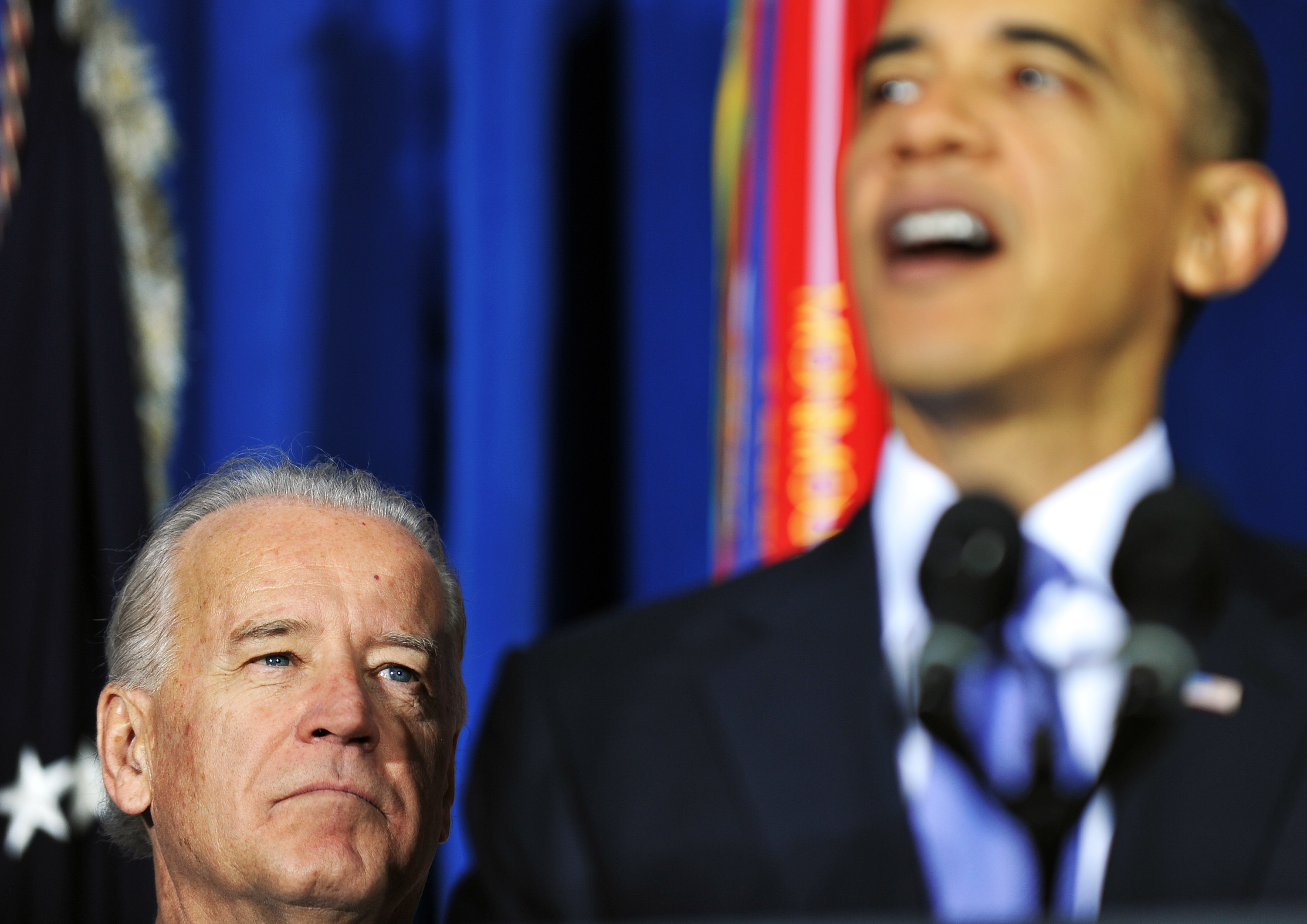
CEDAR RAPIDS, Iowa — Joe Biden walked onto the stage confidently at last month’s LGBTQ Presidential Forum, ready to accentuate his role in accelerating nationwide support for marriage equality and to reaffirm his commitment to gay and transgender rights.
He was quickly knocked off his stride.
An awkward introduction kept Biden from delivering a proper opening statement. Tough questions about his past opposition to same-sex marriage and his more recent kind words for Vice President Mike Pence, a villain to the LGBTQ community, put him in a sarcastic mood.
“You’re a lovely person,” he told the moderator, Lyz Lenz of the Cedar Rapids Gazette.
And suddenly, Biden — who as vice president became a hero to the LGBTQ community by endorsing same-sex marriage on national TV at a time when Barack Obama was quiet on the matter — was on the defensive.
“I’m the first person nationally to come out and say in front of everyone that I didn’t have to go through any period of adjustment,” Biden told the audience inside Coe College’s Sinclair Auditorium. “I came out on Meet the Press in support of gay marriage before anyone else did nationally that was on the scene, number one. And the reason I did is I didn’t have to evolve.”

The moment presented a challenge: how to balance a virtue of Biden’s legacy against the real-time politics of a presidential campaign. His leadership on marriage and other LGBTQ issues might be his strongest progressive credential in a Democratic primary where many voters on the left have written him off as an old-fashioned centrist. Biden has said that protecting rights through an Equality Act would be his top priority if elected.
But he did evolve, at least publicly. He’s just not eager to explain why he changed his political position.
“Other leaders might come to mind earlier,” Biden rival Pete Buttigieg — the mayor of South Bend, Indiana, and the first openly gay candidate to run a major campaign for president — said aboard his campaign bus in Iowa last week when asked about Biden’s work to promote marriage equality. “But there’s a reason to think that the clock moved more quickly on marriage in the White House because of him. I think we shouldn’t take that away from him.”
Biden allies believe his heart has always been in the right place, even if it took his moderate politics and Catholic faith time to catch up. Those sympathetic to him believe he has a good story to tell, if he tells it that way. “Evolution” became a watchword of the late aughts and 2010s as organizations worked to shift public opinion on LGBTQ rights. One of the goals was to persuade politicians like Obama and Biden, who in 2008 publicly opposed marriage equality, to change their minds. Both were firmly on board by the time the US Supreme Court legalized same-sex marriage in 2015.
“We should be looking at evolution as a good thing and not something you should have to go back and reprove yourself on.”
“We should be looking at evolution as a good thing and not something you should have to go back and reprove yourself on,” Zeke Stokes, the chief programs officer for GLAAD, an LGBTQ rights group that cosponsored the Cedar Rapids forum, told BuzzFeed News. “I think it’s widely perceived that [Biden] very much jumped out in front of the Obama administration at a time when this was critical and moved the ball forward inside the administration and in the culture. His leadership on that was really critical and has continued to be critical.”
Rather than discuss how he got to “yes” on marriage equality, Biden shares anecdotes meant to convey a long-enlightened stance on gay rights. In Cedar Rapids, he offered one that’s become a staple of his stump speech. The gist of the story Biden tells most often: When Biden was a teen, he saw two men kissing in downtown Wilmington, Delaware, as his father drove him to apply for a lifeguarding job.
“Joey, it’s simple,” he recalled his father saying. “They love each other.”
It’s similar to another story Biden has told (in Iowa in 2007 during his last presidential campaign, and to journalist Jo Becker, for her 2014 book Forcing the Spring: Inside the Fight for Marriage Equality, which was adapted that year by the New York Times Magazine) in which Biden’s father forced one of his friends to apologize after insulting a gay couple at a beach in Delaware.
Details large and small have varied in tellings of both. In the lifeguard story, Biden has recalled both being a junior and a senior in high school. In the 2007 version of the beach story, Biden was pushing 40; in the Becker interview, he was in his twenties. And in that latter interview Biden was the father explaining to a son what it meant to see two men kissing. “I said, ‘They love each other, honey,’ and that was it,” Biden recalled to Becker. “So it was never anything that was a struggle in my mind.”
Biden campaign officials declined to explain the inconsistencies. Biden’s admirers, though, believe the details matter less than his overarching message of acceptance.
“I’ve heard him tell it with variations and nuances,” said Evan Wolfson, founder of the group Freedom to Marry, which led the fight for the cause. “It’s an absolute Joe Biden story, and I believe him.”
Whatever Biden saw or said in the ’50s or ’60s or ’70s or ’80s, it’s what he did as a senator in the ’90s that required the later evolution he doesn’t like to acknowledge. He was among the many Democrats who in 1996 voted for the Defense of Marriage Act, which defined marriage as between a man and a woman and was signed into law by then-president Bill Clinton.
Lenz, the writer who grilled Biden last month, also questioned his support for “don’t ask, don’t tell,” the Clinton-era policy that allowed gays, lesbians, and bisexuals to serve in the military, as long as they weren’t open about their sexual orientation. Biden’s vote came via a broader defense bill, after he backed an amendment that would have removed DADT and expressed a preference that the president determine the policy. In 1993, though, DADT was too progressive for some. Liberals, including Barney Frank, an openly gay House member from Massachusetts, saw it as a compromise. As vice president years later, Biden supported its repeal.
“When I first came to Washington, being gay was still grounds for being denied a security clearance,” said Eric Fanning, who worked in Clinton’s Department of Defense and returned during the Obama admistration, where as secretary of the Army he was the first openly gay person to lead a military branch.
DADT, Fanning told BuzzFeed News, in a telephone interview arranged by Biden’s campaign,“was definitely a compromise. It’s probably hard to overstate the opposition [Clinton] faced, not just from Republicans but also from Democrats.”
Biden allies argue that these and other nuances are important in evaluating his record on LGBTQ issues. In 1992, for example, Biden voted to block an amendment that would have denied benefits to same-sex partners in the District of Columbia. When Obama chose Biden as his running mate in 2008, the Advocate, a leading LGBTQ publication, emphasized Biden's support from gay leaders in Delaware and his “84% average on nine congressional scorecards issued by the Human Rights Campaign since 1989.” Biden supporters also note his work to advance a hate crimes prevention bill — named after Matthew Shepard, the gay Wyoming man beat to death in 1998 — signed by Obama 10 years ago this month.
These moves rarely drew as much attention as Biden’s persistent opposition to marriage rights — something he chose to emphasize over the years. In the aughts, Biden was an outspoken critic of Republican calls to draft a constitutional amendment banning same-sex marriage, holding up his DOMA vote as a shield.
"As President Bush said on a previous occasion, this issue should be left to the states,” Biden told the Wilmington News Journal in 2004. “I agree. That's why I voted for the Defense of Marriage Act, which defines marriage as 'a union between one man and one woman' and does not require any state to recognize a same-sex union sanctioned under the laws of another state. This has long been a state issue, and it should remain that way."
And in the 2008 vice presidential debate, Biden reaffirmed a position he and Obama shared. (Obama had endorsed same-sex marriage as an Illinois state senate candidate in 1996 and later flip-flopped to a more conservative position in line with national politics.)
“Let's try to avoid nuance, senator,” the debate’s moderator, Gwen Ifill, pressed after Biden spoke of supporting same-sex benefits. “Do you support gay marriage?”
“No,” Biden replied. “Barack Obama nor I support redefining from a civil side what constitutes marriage. We do not support that. That is basically the decision to be able to be left to faiths and people who practice their faiths the determination what you call it.”
Biden’s answer was almost indistinguishable from his Republican rival’s: “Your question to him was whether he supported gay marriage,” Sarah Palin observed, “and my answer is the same as his, and it is that I do not.”
The early Obama years were filled with tension between the White House and LGBTQ community. Advocates saw slow movement on their issues and were particularly frustrated when the administration defended DOMA in court.
Biden was more open about his feelings in private, one former aide told BuzzFeed News. Moe Vela — who believes he is the first openly gay person to hold high-level roles for two vice presidents, Biden and Al Gore — said he asked Biden where his heart was on marriage before accepting a job in 2009 as Biden’s director of management and administration.
“He confided in me — I can say it now, obviously — he confided in me and said, ‘Absolutely, unequivocally, the way it should be,’” said Vela. “To him it was a matter of civil rights.”
“He confided in me — I can say it now, obviously — he confided in me and said, ‘Absolutely, unequivocally, the way it should be.’”
Vela also recalled a 2009 ride with Jill Biden, Biden’s wife, to an LGBTQ event she headlined in New York. The second lady, in Vela’s remembering of the conversation, wondered if she should publicly declare her support for marriage equality. “I held her hand and said, ‘I love you, we love you, our community loves you. Regrettably, this is not the place to be able to say it.’”
It remains unclear, though, why it took so long for Biden’s private beliefs to inform his public policy.
“I don’t know if there was a crystallizing moment,” said Wolfson, the Freedom to Marry founder. “What I imagine was true was, like most reachable Americans, he was always conflicted. He may have felt bad about his vote on DOMA.”
Fanning, who had by then returned to the Pentagon, said he saw in those first Obama years a changed political environment and a president and vice president committed to undoing DADT. Biden, in particular, had demonstrated a commitment to LGBTQ equality, Fanning said. “He was fully on board for these issues.”
With Biden by his side, Obama signed legislation in 2010 that repealed DADT and said he was evolving on marriage.

"I think the country's evolving,” Biden said a few days later on Good Morning America when asked where he stood, “and I think there’s an inevitability for a national consensus on gay marriage.”
In 2012, as Obama and Biden ran for a second term, Biden went public with his surprise reversal: “I am absolutely comfortable with the fact that men marrying men, women marrying women, and heterosexual men and women marrying one another are entitled to the same exact rights, all the civil rights, all the civil liberties,” he said on Meet the Press.
Biden had hinted several weeks earlier, behind closed doors at a fundraiser hosted by a gay couple, that his thinking had changed. (“Things are changing so rapidly, it’s going to become a political liability in the near term for an individual to say, ‘I oppose gay marriage,’” Biden said at the event, according to a 2014 account in the New York Times.) But for the moment he was conspicuously out in front of Obama, something otherwise unheard of during their time together, and his office initially downplayed the Meet the Press remarks. The vice president, a spokesperson said then, “was expressing that he too is evolving” on marriage.
“I think his story was that he wasn’t the first to get there, and he wasn’t the leader, but he had an open heart and wanted to do the right thing,” Wolfson said. “And he connected with people, and he listened, and he moved — and when he moved, he was willing to stick his neck out. He took a little while, but the good qualities of Joe Biden got him to the right place and kept him there.”
Marriage equality eventually became a reelection rallying cause for Obama and Biden in 2012. And many credit Biden’s endorsement for moving public opinion in favor of marriage rights. Voters that fall in Maine and Maryland backed ballot measures legalizing same-sex marriage.
“People didn’t think we were going to win,” Emily Hecht-McGowan — a Marylander who led LGBTQ equality programs for the Biden Foundation, the nonprofit Biden and his wife established after he left office — told BuzzFeed News in an interview arranged by Biden’s campaign. “I personally believe that the turning point in 2012, at least in Maryland, was the vice president coming out on Meet the Press and talking about how he was in favor of marriage equality.”
The Biden Foundation, which suspended operations when the former vice president launched his White House bid this year, promoted acceptance and inclusion initiatives targeting families of LGBTQ youth. A collaboration with other organizations involved a storytelling campaign focused specifically on transgender and gender-nonconforming youth.
“We are in a period of time right now where it seems to feel as though we are moving backwards, and in some cases we are moving backwards, given where this current administration is,” Hecht-McGowan said. “But I don’t think you can dilute or erase the impact that Vice President Biden has had on this issue — on marriage, in particular, but also on the quest, so to speak, for LGBTQ equality for the community. He is an unwavering champion.” ●

